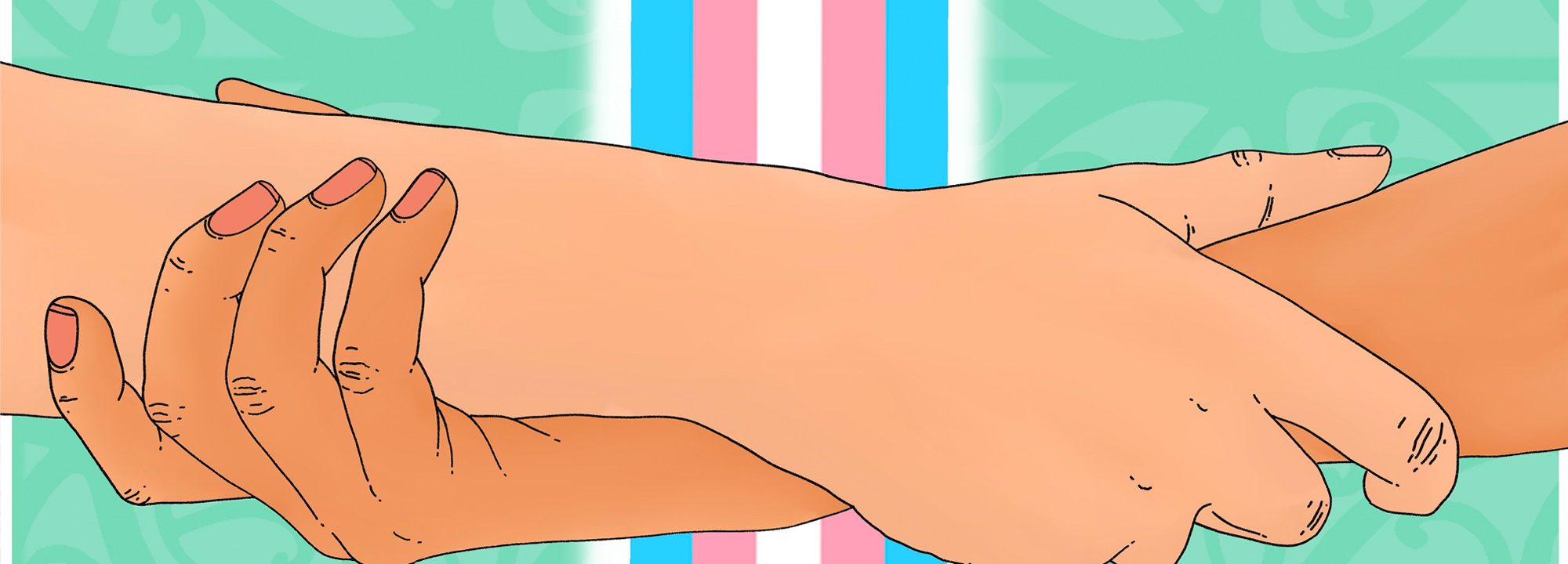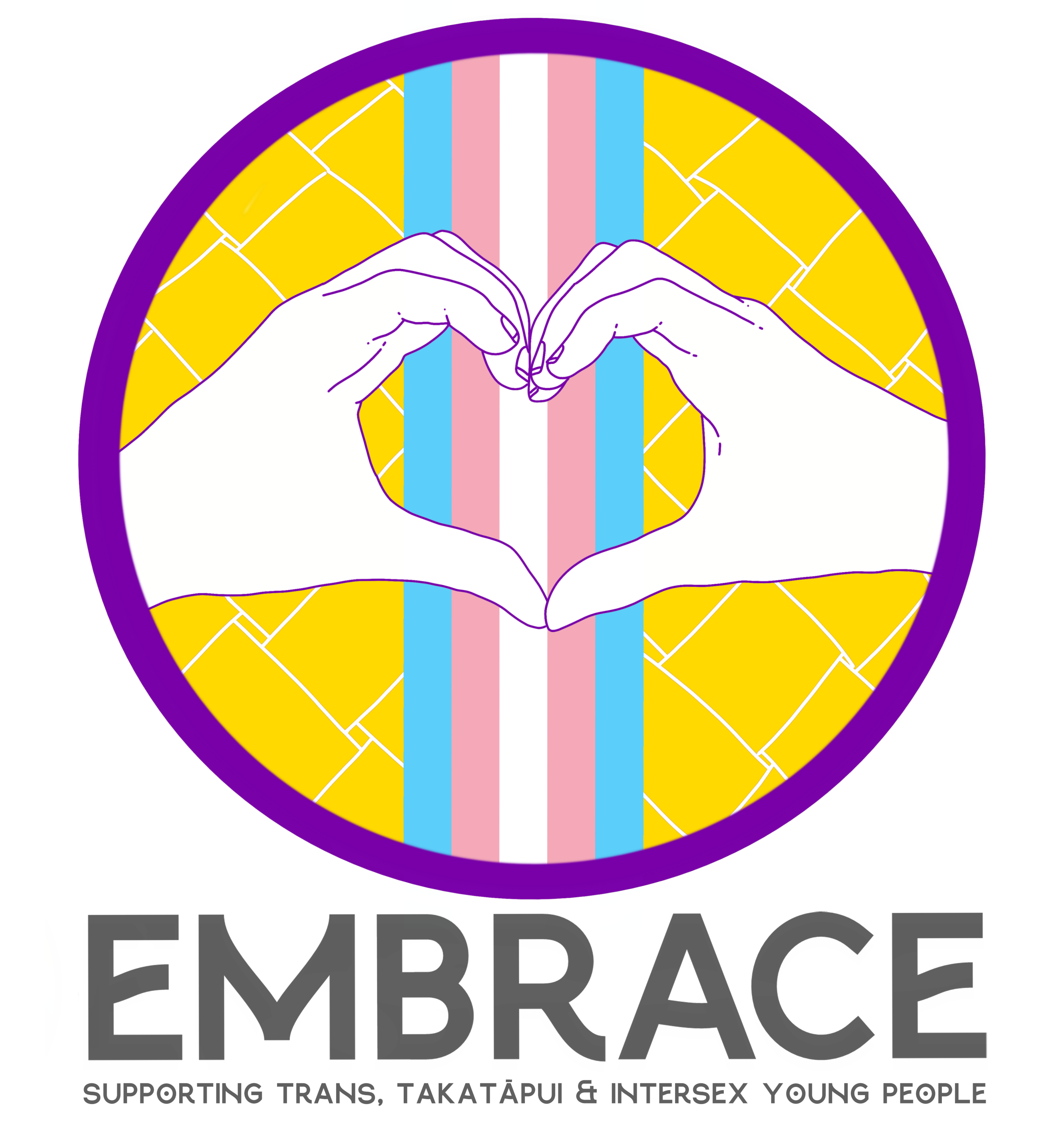
We welcome our trans, takatāpui* and intersex people, whānau, communities and organisations to this space where you can learn how we, The Tindall Foundation, want to support you and your work. We are excited to be launching Embrace and working to support positive change for trans, takatāpui* and intersex young people across Aotearoa New Zealand.
Since 2018 we have been working to develop the Embrace strategy and donation stream to increase our funding and support so that this community feel included, valued, visible, safe, respected, celebrated and loved by their whānau and communities. We have held hui, undertaken desktop research and spoken to organisations which support trans, takatāpui and intesex people to develop this work. We started out asking “What is going on for women, young women, and gender-diverse young people in Aotearoa New Zealand?”. This has led our Trustees and staff to increasing concrete and targeted support and resources for this community, guided by the Embrace strategy.
We envision a world where this community no longer experiences discrimination and stigma within health, education, employment, state care, housing, communities and households in our country. We would hope to see, in the short to medium term, evidence of increased understanding and acceptance of young people in their homes, schools, workplaces and the community. We are looking for applications from organisations and groups that are led by, and work with trans, takatāpui and intersex young people to improve their wellbeing and safety, and to meet their evolving needs.
We would like to acknowledge the massive amounts of paid and unpaid work (historical and contemporary) that has been undertaken in this area, and we applaud the strength and leadership within these organisations. We recognise the need for greater financial and capacity support so they can build on the mahi they are already doing. We look forward to developing high-trust, open partnerships that we hope will have a lasting impact. This is an exciting journey and there is so much for us to learn.
*When we use takatāpui in this work, we are talking about trans, non-binary, intersex and gender-diverse Māori specifically.
To see more images from artist Huriana Kopeke-Te Aho go to https://www.instagram.com/hurianakt.a/
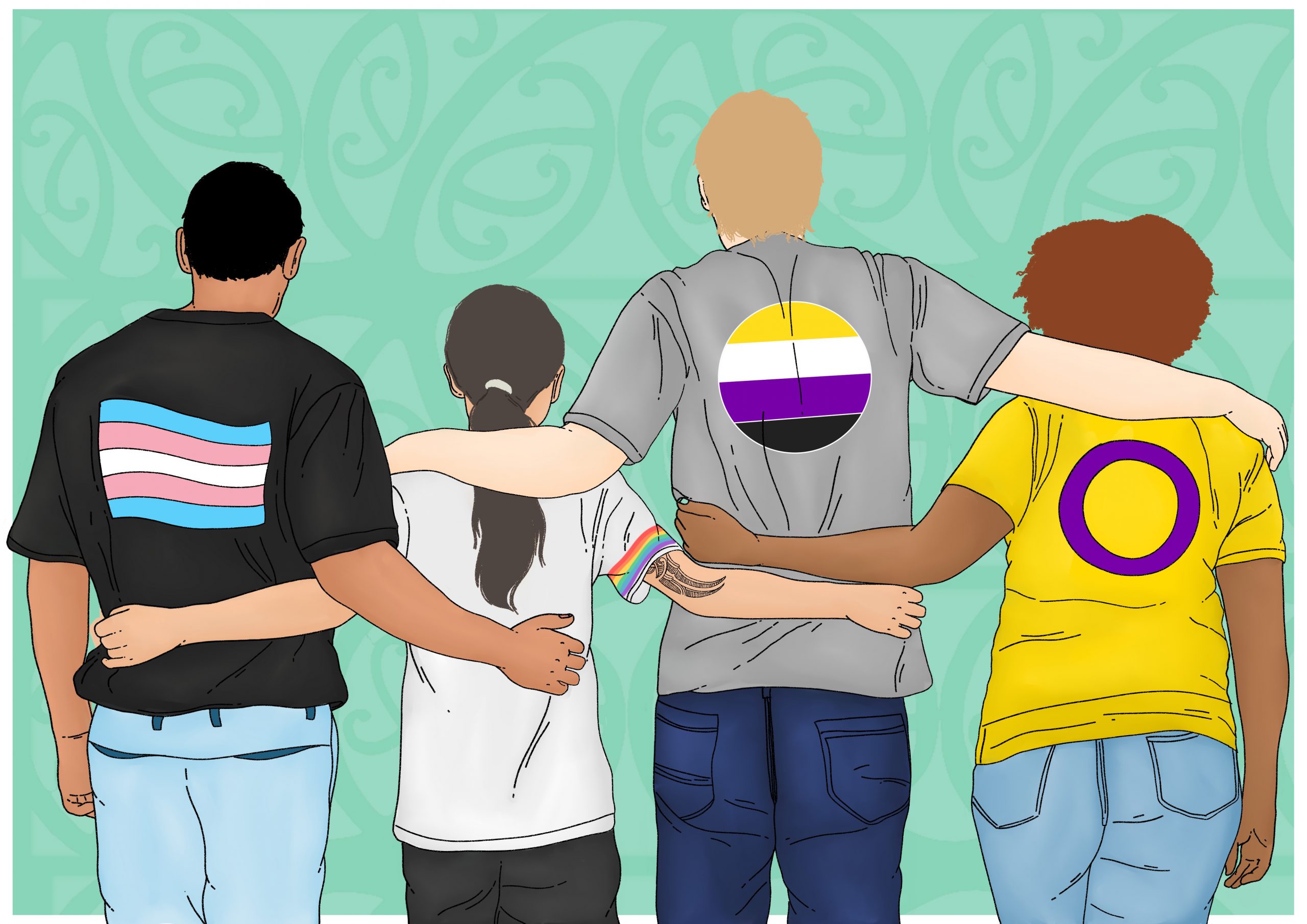
Our Guiding Principles:
We are guided by our principles while undertaking this mahi. Our principles are:
- Support positive change for trans, takatāpui and intersex young people across Aotearoa New Zealand.
- Work in a respectful way, listening to our community, working towards change by supporting organisations and groups to help achieve their goals.
- Aid the community in their work for change at both an individual and systems level.
- Elevate the voices of trans, takatāpui and intersex youth through communication channels and networks.
- Work within our size and ability and accepting our limitations.
- Collaborate with other philanthropic organisations.

Donations and Support
Donations will be both proactive (TTF approaching organisations working in this space) and reactive (accepting applications). We will take a light-touch approach with the knowledge that rainbow, trans, takatāpui and intersex communities know what is best for young people.
Non-financial support includes working with other funders, convening, leveraging, capacity building, influencing, advocating, leveraging funds and communicating.
National and larger-scale work will be supported through The Tindall Foundation directly, with no closing dates. For local work, donations will be between $500 – $15,000 (depending on the size of the region concerned) and these will have donation closing dates; please get in touch directly with us for more information. Our hope is that funding will be flexible, responsive, progressive, innovative and non-competitive.
We will fund and support organisations led by and working with trans, takatāpui and intersex youth to:
- Increase access to information and support for young people and their whānau
- Offer safe homes and alternative housing and/or influence and work with other sectors to reduce family and sexual violence.
- Collect and promote inclusive and culturally appropriate information, disseminate positive messaging, share up-to-date New Zealand data.
- Increase visibility and advocate for change.
- Offer pathways for wellbeing, safety and leadership.
Through our donations we also hope to help rainbow and youth sectors to:
- Increase knowledge and capacity to support young people in the best way possible.
- Work collaboratively within and across sectors.
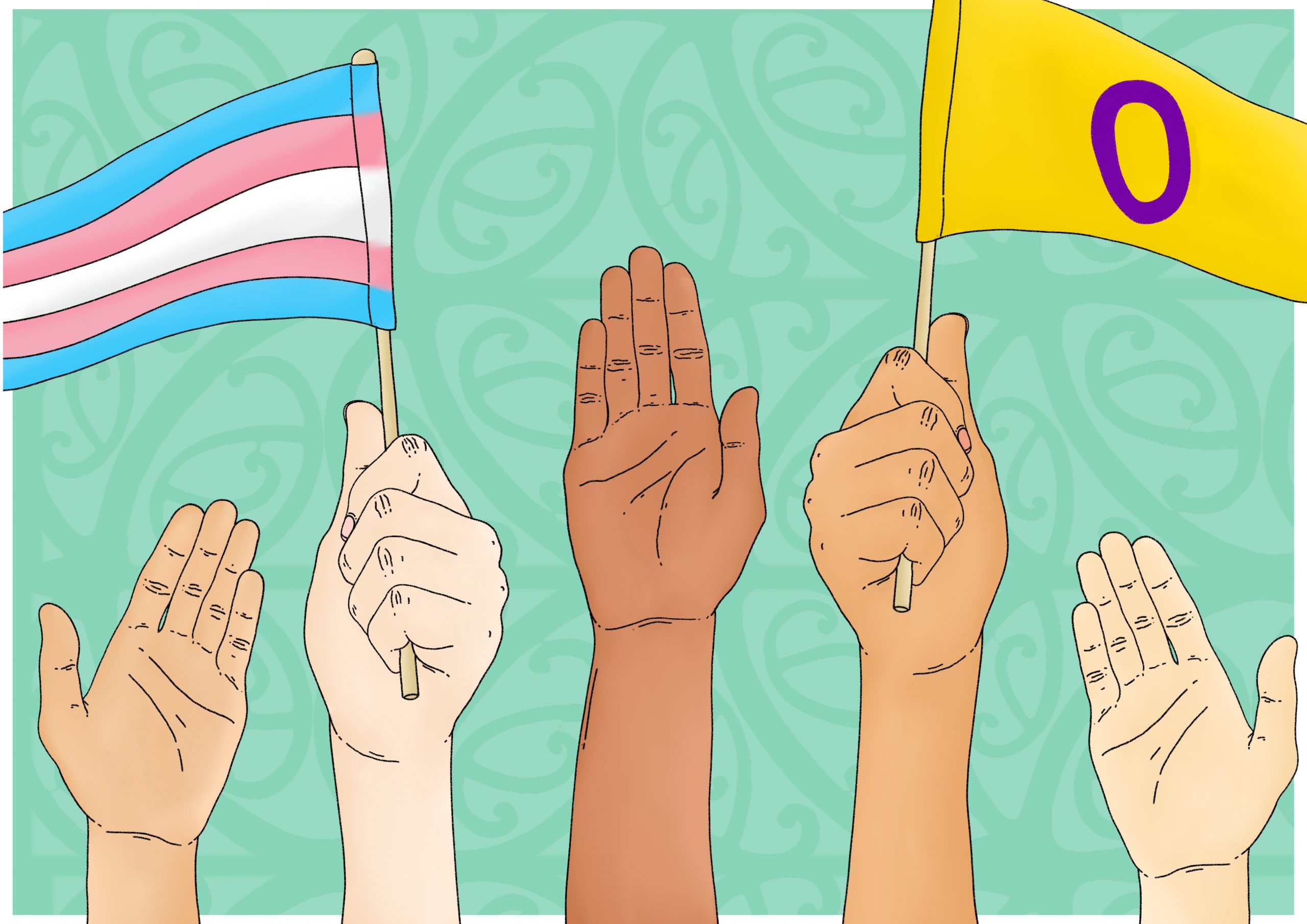
Who can apply?
- Trans, takatāpui and intersex and/or rainbow groups in Aotearoa New Zealand working with young people 12–28 years old (these do not have to have charitable status but do need to have charitable purpose).
- Trans, takatāpui and intersex and/or rainbow groups partnering with other community organisations and sectors to deliver work to support young people and their families in the right ways for them.
- Other groups like Pasifika, Te Ao Māori or disability groups that are working to improve wellbeing and reduce violence for intersex, trans or takatāpui young people.
More weight will be given to initiatives that:
- Increase safety and wellbeing for trans, takatāpui and intersex youth who:
-
- Have intersectional identities/experiences, for example are trans Māori, Pasifika, resettled, or have a disability
-
- Live regionally/remotely
-
- Have experienced intergenerational exclusion
- National or regional initiatives to increase the wellbeing and safety of trans, takatāpui and intersex young people, including:
-
- Initiatives that promote and increase positive and accurate information, messaging and visibility
-
- Support for families, young people and their communities, including face to face, online, over the phone and/or development and distribution of toolkits and information
-
- Inclusive research and data led by and with trans, takatāpui and intersex people in Aotearoa New Zealand
- The upskilling of mental health and other providers to enable excellent care for young people
- National initiatives to increase social acceptance and belonging
- Enabling services to be safe, effective and culturally appropriate, including through training and ongoing professional development for providers, and wider support for systems change
-
- Rainbow, trans and intersex organisations and leaders work alongside family violence sector to upskill, improve practice and facilities, and be inclusive of trans, takatāpui and intersex people
-
- Care providers are upskilled in providing correct support for trans, takatāpui and intersex young people
Embrace supports:
- Access to wellbeing and therapeutic models of practice for trans, takatāpui and intersex young people and those working in organisations that support these young people
- Supervision for youth workers and those working in rainbow, trans, takatāpui and intersex organisations
- Resourcing organisations to provide peer support and affirming environments
- Initiatives that enable young people to be supported to live in safe homes, especially while under 18
- Rainbow, trans, takatāpui and intersex organisations are able to improve capability and capacity organisationally, pay workers well and support volunteers with ongoing training
- Initiatives increase confidence, skills and leadership opportunities for trans, takatāpui and intersex young people
We have big aspirations for what the future could look like and we hope with our funding and support progress can be made so that trans, takatāpui and intersex young people:
- Are safe in their homes and all spaces, and free to be themselves
- Flourish within a well-funded and supported social sector
- Have access to appropriate care, resources and information
- Are understood and included by state, private facilities and community initiatives
- Can work with government to progress their priorities and needs
How this relates to TTF strategy
TTF funds in three main areas: family, community and environment. The Embrace mahi falls within family and community; see the priorities for these areas on our website. We are looking for initiatives that align with these priorities, and where outcomes can be demonstrated or evaluated using a community-participation approach.
Note that national and large-scale applications have no closing date, whereas local/regional applications will be applying through our Local Donation Managers and will need to submit by the closing dates.

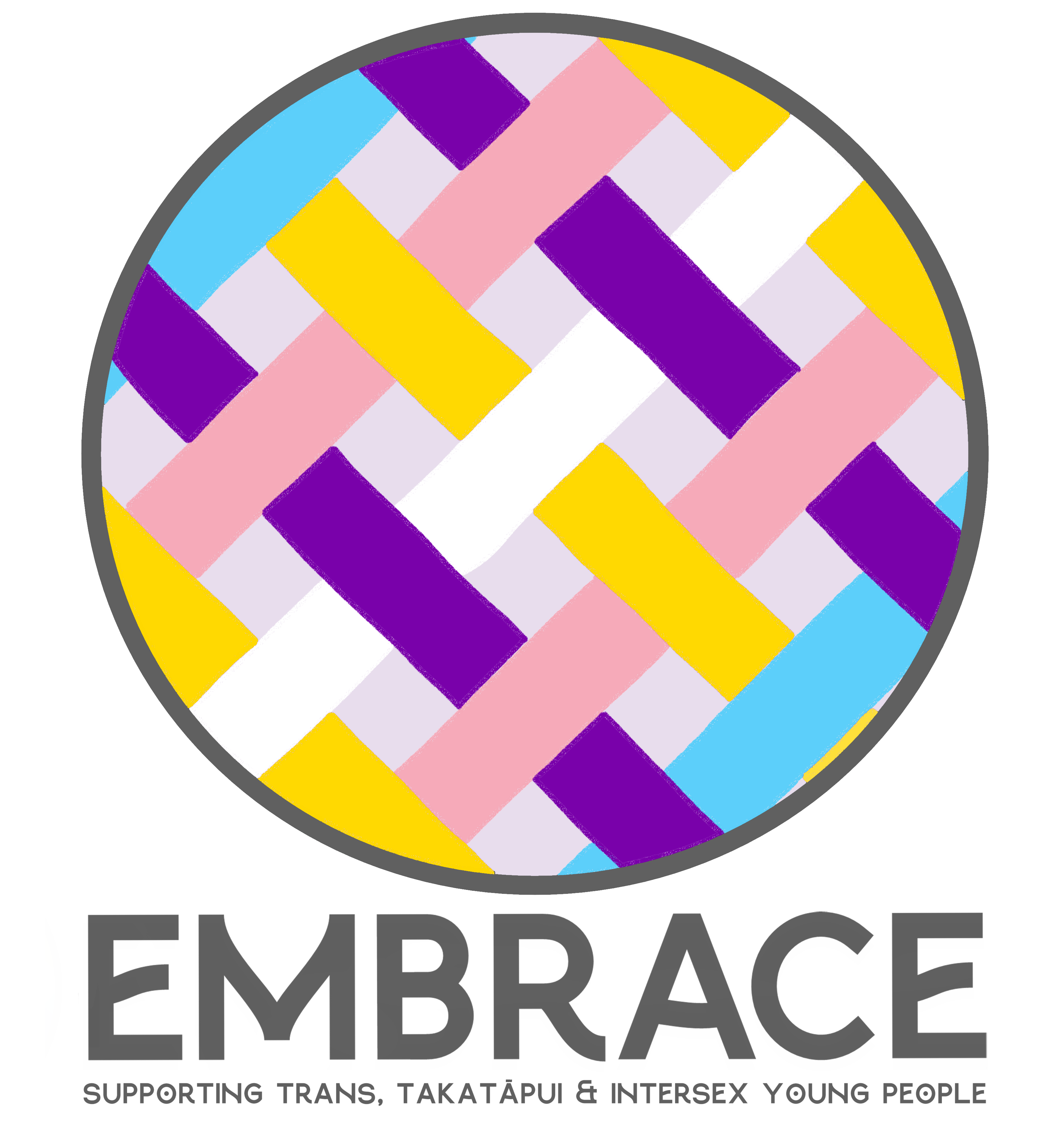
Glossary of terms
Language is constantly changing and context specific. Many of the terms and concepts we are using in our work are used differently by different people. Some are community-driven terms and some are in wider circulation. We are providing this glossary as a starting point for our own learning, and acknowledge that it could never be complete or definitive. We hope that providing this glossary is a small effort towards wider public education about how to navigate these concepts in a way that supports self-determination and fosters spacious and loving relationships within families and communities.
Sex
A person’s sex is based upon their sex characteristics, such as their chromosomes, hormones and reproductive organs. While typically based upon the sex characteristics observed and recorded at birth or infancy, a person’s sex can change over the course of their lifetime and may differ from their sex recorded at birth.
Sex Characteristics
Refers to a person’s primary and secondary sex characteristics, for example an individual’s sex chromosomes, hormones, reproductive organs, genitals, and breast and hair development.
Gender
Gender is a social and cultural phenomenon and means different things in different times and places. Gender is often (but not always) understood as an important aspect of personhood. It is impossible to understand gender without considering the cultural context of a person or population. In a Western patriarchal context, the idea that there are only two genders (man and woman, sometimes referred to as male and female) is dominant and other ways of considering gender are often punished. In practice, there are many genders, and there are people who don’t identify as any gender. Gender is often understood as having an impact on the kinds of social and familial expectations, roles, and behaviour that a person performs. A person’s gender is self-determined — only you can accurately assert your gender. Your understanding of what is possible (in terms of gender and how it relates to your social world/whānau/ancestors and so on) is determined by a complex interaction between you and the people and environments that surround you.
Transgender and Trans
We use trans as a shorthand term that relates to the more formal-sounding term transgender. We are using both as umbrella terms that may include anyone whose gender (as they define it) is different to the sex or gender they were assigned at birth. This includes some people who are intersex — those who also identify as trans or transgender. We recognise that not everyone uses words like trans and transgender, and that these are primarily white, Western concepts that not everyone will relate to or find useful. We acknowledge these terms are connected to colonisation and may or may not be relevant to Māori and Pacific people. Therefore the use of terms like trans and transgender may include tāhine, takatāpui and other Māori gender minorities, as appropriate. We also acknowledge that Māori and other Pacific ways of understanding gender and personhood may not fit into the culturally specific and historically weighted framework of white, Western concepts of trans and transgender. Indigenous people from this region may use terms like whakawahine or tangata ira tane or takatāpui (New Zealand Māori); fa’afafine or fa’atama (Samoa, American Samoa); fakaleitī or leitī (Tonga); fakafifine (Niue); akava’ine (Cook Islands Māori); vakasalewalewa (Fiji); palopa (Papua New Guinea); mahu (Hawai’i); haka huahine (Tokelau); and rae rae (Tahiti). These terms can also be referred to by the acronym MVPFAFF+. We also recognise that many people will use a variety of terms in order to be seen and understood by other people in a variety of contexts, and this is valid. Our goal is not to be definitive about terms but instead to be clear about the importance of supporting our trans, takatāpui and intersex whānau, and continuing to learn and grow from the community leaders and organisations working in this area.
Cisgender
Cisgender is a word that means your gender (as you define it) matches the gender or sex you were assigned at birth. Cisgender is a useful concept because it names the usually unmarked category of being a cisgender man or woman and provides a contrasting term so that instead of saying, for example, “transgender women and … women” (or something equally fraught) you can say “transgender women and cisgender women are welcome to join this women’s group.” It is not an offensive term and some cisgender people find it useful and empowering to be able to name themselves as cisgender allies who support the rights of their transgender whānau.
Takatāpui
Takatāpui has been reclaimed to embrace all Māori who identify with diverse genders and sexualities such as whakawāhine, tangata ira tāne, lesbian, gay, bisexual, trans, intersex and queer. When we use takatāpui in this work, we are talking about trans, non-binary, intersex and gender-diverse Māori specifically. We acknowledge that not all trans, non-binary, intersex or gender-diverse Māori people identify as takatāpui and we recognise that, just as with any indigenous word or concept, it does not translate simply into an equivalent category in a white, Western context.
Intersex
Intersex or ‘variations of sex characteristics’ (VSC) refers to people with innate genetic, hormonal or physical sex characteristics that do not conform to medical and social ideas of how female or male bodies are assumed to be. Intersex is used as an umbrella term to describe these differences in sex traits or reproductive anatomy. There are over 40 different intersex variations. Other terms used to describe being born with variations of sex characteristics are intersex person, a person with an intersex variation, or in medical settings ‘differences of sex development’ (DSD).
Endosex
Endosex is a word that means the opposite of intersex. It means that a person has innate physical sex characteristics that match what is expected for female or male bodies within patriarchal Western constructs. Innate means that the person is born with these characteristics, including chromosomes, hormones, genitals and other anatomy.
Rainbow
Rainbow is a word that is more likely to be used collectively, for example, “rainbow populations” or “rainbow organisations” or “rainbow community development,” and less likely to be used individually. We are using it because many (but not all) of the organisations that we are working with in this area find it to be a useful umbrella term to describe the broadest and most inclusive definition of a group that is made up of many different people using many different terms to describe their sex, gender and/or sexuality. Rainbow is often used instead of an acronym like “LGBTI” (Lesbian, Gay, Bisexual, Transgender and Intersex) because acronyms are lists of terms that are inevitably incomplete and reflect white, Western ways of understanding personhood. Not all people who identify as trans or takatāpui or intersex identify as being part of rainbow communities or rainbow organisations. There are also people and organisations who live and work on the intersections of these spaces, identities and communities.
